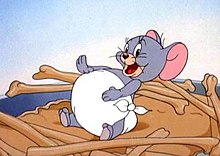Nibbles (Tom and Jerry)
| Nibbles/Tuffy | |
|---|---|
| Tom and Jerry character | |
 Nibbles pats in delight after eating a whole turkey in The Little Orphan (1949). | |
| First appearance | The Milky Waif (1946) |
| Created by | William Hanna Joseph Barbera |
| Voiced by | Francoise Brun-Cottan (1952–1958) Lucille Bliss (1958) Lou Scheimer (1980) Frank Welker (1980) Nancy Cartwright (1993) Alan Marriott (2000–2002) Tara Strong (2002) Reece Thompson (2006) Chantal Strand (2007–2008) Kath Soucie (2010–present) Eri Tanaka (2022) |
| In-universe information | |
| Species | House mouse (Mus musculus) |
| Gender | Male |
| Relatives | Jerry (uncle/brother) Muscles Mouse (cousin) Merlin Mouse (cousin) Uncle Pecos (great uncle) |
| Nationality | American French (Mouseketeers trilogy) |
Nibbles (also known as Tuffy) is a fictional character from the Tom and Jerry cartoon series. He is the little, blue/gray, diaper-wearing orphan mouse whose cartoon debut came in the 1946 short The Milky Waif.[1] Tuffy was later featured in the 1949 Academy Award-winning short The Little Orphan,[2] as well as Two Little Indians and The Two Mouseketeers (both 1952).[3]
Origin and development
[edit]The character's first actual appearance came in the 1942 comic book Our Gang Comics #1, where despite his diaper, he was presented as a peer of Jerry rather than a younger individual. Nibbles was created by Gaylord Du Bois. In the comics, the gray mouse's name was given as "Tuffy" from the start.[4] In the animated series. Tuffy is depicted as a hungry and curious orphaned mouse where he is mentioned to live at the fictional Bide-a-Wee Mouse Home. After his first three appearances in Tom and Jerry theatrical shorts, Tuffy starred in The Two Mouseketeers and was voiced by Francoise Brun-Cottan where the character mostly speaking in French. She would later voice the character again with three sequels of the trilogy and the last was Royal Cat Nap in 1958 and that year, Lucille Bliss voiced Nibbles in Robin Hoodwinked, where the character made his final theatrical appearance at the time of the Golden Age of Animation.
Featured cartoons
[edit]- The Milky Waif (1946)
- The Little Orphan (1949)
- Safety Second (1950)
- The Two Mouseketeers (1952)
- Two Little Indians (appears with an identical twin) (1953)
- Life with Tom (1953)
- Little School Mouse (1954)
- Mice Follies (1954)
- Touché, Pussy Cat! (1954)
- Tom and Chérie (1955)
- Feedin' the Kiddie (1957)
- Royal Cat Nap (1958)
- Robin Hoodwinked (1958)
- Pied Piper Puss
- No Museum Peace
- Musketeer Jr.
- Cat Nebula
- Cat Show Catastrophe
- Cat of Prey (cameo appearance)
- Sasquashed
- DJ Jerry (cameo appearance)
- Haunted Mouse
- What a Pain
- Tuffy Love
- Just Plane Nuts
- Pets Not Welcome
- Cruisin' for a Bruisin'
- Hunger Strikes
- Say Cheese
- Picture Imperfect
- Slinging in the Rain
- The Paper Airplane Chase
- Say Uncle
- Here Comes the Bride
- Tuffy's Big Adventure
- Hockey Jockey
Voice actors
[edit]- English
- Francoise Brun-Cottan (1952–1958)
- Sara Berner: laughing in Little School Mouse (1954)[5]
- Lucille Bliss: Robin Hoodwinked (1958)
- Lou Scheimer: The Tom and Jerry Comedy Show[6]
- Frank Welker: The Tom and Jerry Comedy Show (wraparound segments in episodes 1-2, 8)
- Nancy Cartwright: Tom & Jerry Kids
- Alan Marriott: Tom and Jerry in Fists of Furry, Tom and Jerry in War of the Whiskers
- Tara Strong: Tom and Jerry: The Magic Ring
- Reece Thompson: Tom and Jerry Tales (season 1)
- Chantal Strand: Tom and Jerry: A Nutcracker Tale, Tom and Jerry Tales (season 2)
- Kath Soucie: (2010–present), Tom and Jerry Meet Sherlock Holmes, Tom and Jerry and the Wizard of Oz, The Tom and Jerry Show, Tom and Jerry: Willy Wonka and the Chocolate Factory, Tom and Jerry: Snowman's Land
- Grey DeLisle: Mad
- Japanese
- Eri Tanaka: Tom and Jerry Japanese shorts
References
[edit]- ^ Barrier, Michael (2014). Funnybooks: The Improbable Glories of the Best American Comic Books. University of California Press. p. 123. ISBN 978-0520283909.
- ^ Barrier, Michael (1999). "MGM, 1939-1952". Hollywood Cartoons: American Animation in Its Golden Age. Oxford University Press. ISBN 9780198020790.
- ^ Maltin, Leonard (1987). Of Mice and Magic: A History of American Animated Cartoons (Revised ed.). Plume. p. 303. ISBN 0-452-25993-2.
- ^ Becattini, Alberto (2019). "MGM: Home of Tom and Jerry". American Funny Animal Comics in the 20th Century: Volume One. Seattle, WA: Theme Park Press. ISBN 978-1683901860.
- ^ Scott, Keith (October 3, 2022). Cartoon Voices of the Golden Age, Vol. 2. BearManor Media. p. 192.
- ^ Perlmutter, David (2018). The Encyclopedia of American Animated Television Shows. Rowman & Littlefield. p. 648. ISBN 978-1-5381-0374-6. Retrieved 15 February 2020.
